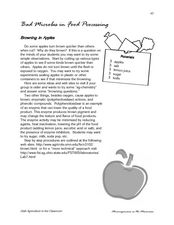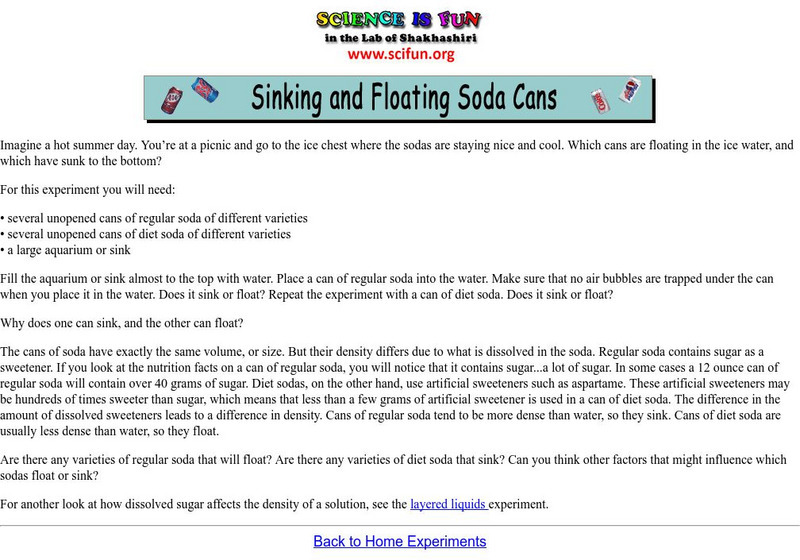Curated OER
How Long Does Trash Last
Students work in cooperative groups to estimate how long trash lasts in a landfill. They study environmental consequences of not recycling and use graph-making software to create a graph that illustrates the lifespan of trash items...
Curated OER
Exploring the Properties of Matter in the Preschool
Students study the properties of the physical and natural world. In this properties of the physical and natural world instructional activity, preschool students work at discovery tables to see how simple machines work, what happens when...
Curated OER
Surface Tension and 3D Soap Films
Students are introduced to the concept of surface tension, its dependence on material composition, and how it can produce uniquely shaped surfaces.
Curated OER
Bad Microbes in Food Processing
Students complete an experiment to determine if there are bad microbes in food processing.In this bad microbe experiment, students use apples to see how they react to oxygen. Students test apples with chemicals to observe the changes.
Curated OER
Water Rocket
Students study the basic operation of a water rocket. In this propulsionlesson students complete several experiments on constructing a bottle rocket launcher.
Curated OER
Blast Off to Learning
Young scholars explain the laws of volume and pressure, identify what a limiting reagent is and why it is important in a chemical reaction, and distinguish between fossil fuels and renewable energy sources.
Curated OER
Volcano!-Thar She Blows!
Middle schoolers describe how volcanoes are formed. They name the types of boundaries where volcanoes occur. They utilize models to illustrate the occurence of volcanoes and earthquakes along plate boundaries. They compare and constrast...
Curated OER
Recycling Rapping
In this recycling worksheet, students read facts about recycling. Students complete a word scramble and a maze for the recycling activity.
Curated OER
What Do Concentrations Mean?
Students investigate the concept of climate gases and practice using the appropriate measurement terms. The lesson includes information that is used by the teacher to conduct class discussion or as a source of background for students.
Curated OER
Cavern Geology: Speleothem Construction
Students discover how underground rock formations grow. They perform various activities based on grade level.
Curated OER
Volcanoes
Fifth graders study volcanoes. They watch a demonstration that represents the eruption of a volcano and discuss the similarities and differences between the model and a real volcano.
Curated OER
Activity #20 Tear An Aluminum Can In Half
Students observe the chemical reaction between CuCl2 and aluminum. They identify the evidence for a chemical change. Pupils answer the following questions after observing the experiment: How do you know a chemical reaction occurred?,...
Curated OER
Quiz 6A: Indefinite Pronouns
In this grammar activity, learners fill in the blanks of the sentences with indefinite pronouns. There are 21 sentences to complete.
Curated OER
QUIZ 6A: Indefinite Pronouns
In this indefinite pronouns instructional activity, students examine 21 sentences and fill in the blanks with "anything, nothing, anyone, anybody, no one, or nobody".
Other
Center for Science in the Public Interest: Liquid Candy
Read statistics about the consumption of soft drinks in America by teens and how soda can affect one's health. Includes information on how soft drink are related to diabetes, obesity, tooth decay, and more.
Other
Easy Science Experiments: The Incredible Can Crusher
Can you crush a soda pop can with your bare hands? Try this experiment where with the help of air pressure you can show your friends what kind of strength you have. Make sure you stay safe! There is a video included.
Science is Fun
Science Is Fun: Dancing Raisins
An experiment in buoyancy which involves making raisins float by using carbonated soda pop. Students then try the same test with other materials. Instructions for making one's own carbonated liquid are also provided.
Science Fun for Everyone
Science Fun: Vinegar Pops
See what happens when you dip a popsicle made of vinegar into a plate of baking soda in this science experiment.
Science is Fun
Fun Science: Sinking and Floating Soda Cans
Why do some pop cans float in water while others don't? This easy experiment is a great example of the principle of density.


















